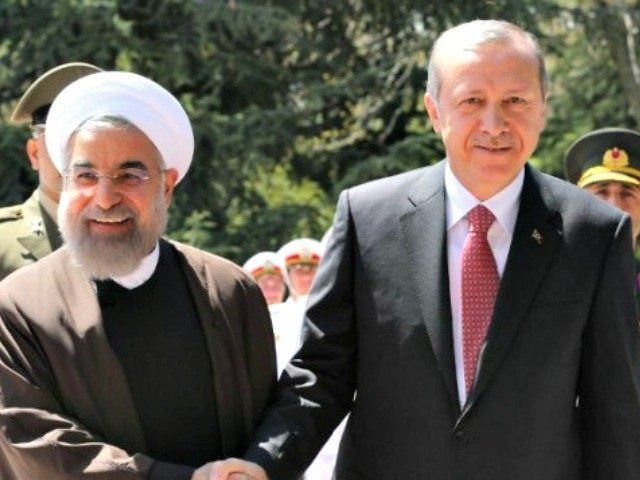Turkish President Recep Tayyip Erdogan arrived in Tehran this morning to discuss economic and political negotiations with Iran. Once close allies, Erdogan’s visit arrives a week after the president declared that Iran’s meddling in Yemen “has begun annoying us,” and accused the Islamic Republic of attempting to “dominate the region.”
The Wall Street Journal reports that much of the meeting between Erdogan and President Hassan Rouhani involved discussing the two nations’ economic ties. “Turkey is the most prepared country for Iran to be free of sanctions, for Iran’s economy to normalize,” Turkish Economy Minister Nihat Zeybekci said on Monday, shortly before Erdogan’s departure.
Turkey, the Journal notes, seeks to expand its trade with Iran threefold, particularly in the energy sector. Rouhani did not fail to thank Turkey for its support against the West in calling for Iran to be permitted to develop nuclear technology, despite Ayatollah Ali Khamenei’s decades-long call for the destruction of Israel and chants of “death to America” days before the announcement of a deal.
In total, the two leaders signed eight agreements in various economic sectors, and Erdogan announced that he hoped the countries could increase their trade to up to $30 billion this year, though that remains a lofty goal at the moment. But, as the Jerusalem Post notes, Yemen was not entirely out of the discussion, but was discussed in a general way.
Iran’s state media Press TV reported that the meeting was intended to focus significantly on “regional developments, particularly those in Syria, Iraq, and Turkey.” The quotes from Erdogan and Rouhani following the meeting provide little more detail as to the nature of their conversation.
“We have to put an end to this bloodshed, this death,” Erdogan said of the Yemen disaster, according to the Jerusalem Post. “We both believed that it is necessary for us to witness the end of war and bloodletting in Yemen as soon as possible,” Rouhani asserted.
In a separate public statement, Turkish Foreign Minister Mevlüt Çavuşoğlu clarified that Turkey seeks an active role in halting the violence in Yemen. “Turkey can play a significant role [in the Yemeni crisis] and mediate [between the sides],” Çavuşoğlu stated.
The conciliatory tone regarding the developing violence in Yemen draws a sharp contrast with how Turkish and Iranian officials described the situation merely days ago.
Iran has been accused repeatedly of supporting Yemen’s Shiite Houthi rebels, who staged a coup and deposed President Abed Rabbo Mansour Hadi. The result has been a conflict rapidly developing into a civil war between Yemen’s Shiite north and Houthi south. In an attempt to prevent the Houthi rebels from taking full control, Saudi Arabia announced it would enter the fray with a coalition of Sunni Arab states, and committed 150,000 soldiers to the effort.
Turkey has not announced it would join the Arab coalition, but Erdogan has publicly considered the possibility. In statements following the Saudi decision to enter the battlefield, Erdogan said that Iran “has started to annoy us” and accused the nation of “trying to dominate the region.”
“It would be better if those who have created irreparable damages with their strategic blunders and lofty politics would adopt responsible policies,” retorted Iranian Foreign Minister Mohammad Javad Zarif.
One sign that these tensions have not fully been resolved is that Erdogan agreed to meet with Saudi Deputy Crown Prince and Interior Minister Prince Mohammad bin Nayef al-Saud last night, shortly before taking off to Tehran. The “lengthy” visit was not on the official schedule of presidential events, Hurriyet reports, and while it is believed that Yemen was a main topic of discussion, no evidence confirming so has surfaced.

COMMENTS
Please let us know if you're having issues with commenting.